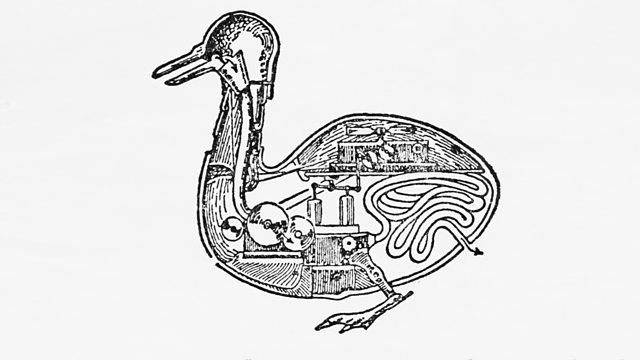Automata
Melvyn Bragg and guests discuss the history of ideas about machines imitating living creatures, and the questions they raise about the differences between machinery and humanity.
Melvyn Bragg and guests discuss the history of real and imagined machines that appear to be living, and the questions they raise about life and creation. Even in myth they are made by humans, not born. The classical Greeks built some and designed others, but the knowledge of how to make automata and the principles behind them was lost in the Latin Christian West, remaining in the Greek-speaking and Arabic-speaking world. Western travellers to those regions struggled to explain what they saw, attributing magical powers. The advance of clockwork raised further questions about what was distinctly human, prompting Hobbes to argue that humans were sophisticated machines, an argument explored in the Enlightenment and beyond.
The image above is Jacques de Vaucanson's mechanical duck (1739), which picked up grain, digested and expelled it. If it looks like a duck...
with
Simon Schaffer
Professor of History of Science at Cambridge University
Elly Truitt
Associate Professor of Medieval History at Bryn Mawr College
And
Franziska Kohlt
Doctoral Researcher in English Literature and the History of Science at the University of Oxford
Producer: Simon Tillotson
Last on
LINKS AND FURTHER READING
Μύ
READING LIST:
Minsoo Kang, Sublime Dreams of Living Machines: The Automaton in the European ImaginationΜύ(Harvard University Press, 2011)
Adrienne Mayor, Gods and Robots: Myths, Machines, and Ancient Dreams of TechnologyΜύ(Princeton University Press, forthcoming November 2018)
Jessica Riskin, The Restless Clock: A History of the Centuries-Long Argument Over What Makes Living Things Tick (University of Chicago Press, 2016)
E. R. Truitt, Medieval Robots: Magic, Mechanism, Nature, and Art (University of Pennsylvania, 2015)
Adelheid Voskuhl, Androids in the Enlightenment: Mechanics, Artisans, and Cultures of the Self (University of Chicago Press, 2013)
Gaby Wood, Living Dolls: A Magical History of the Quest for Mechanical Life (Faber & Faber, 2002)
Μύ
Credits
| Role | Contributor |
|---|---|
| Presenter | Melvyn Bragg |
| Interviewed Guest | Simon Schaffer |
| Interviewed Guest | Elly Truitt |
| Interviewed Guest | Franziska Kohlt |
| Producer | Simon Tillotson |
Broadcasts
- Thu 20 Sep 2018 09:00Βι¶ΉΤΌΕΔ Radio 4
- Thu 20 Sep 2018 21:30Βι¶ΉΤΌΕΔ Radio 4
Featured in...
![]()
Medieval—In Our Time
Browse the Medieval era within the In Our Time archive.
![]()
Science—In Our Time
Scientific principles, theory, and the role of key figures in the advancement of science.
In Our Time podcasts
Download programmes from the huge In Our Time archive.
The In Our Time Listeners' Top 10
If you’re new to In Our Time, this is a good place to start.
Arts and Ideas podcast
Download the best of Radio 3's Free Thinking programme.
Podcast
-
![]()
In Our Time
Melvyn Bragg and guests discuss the ideas, people and events that have shaped our world.



